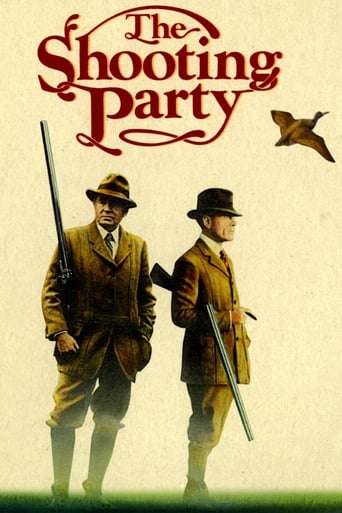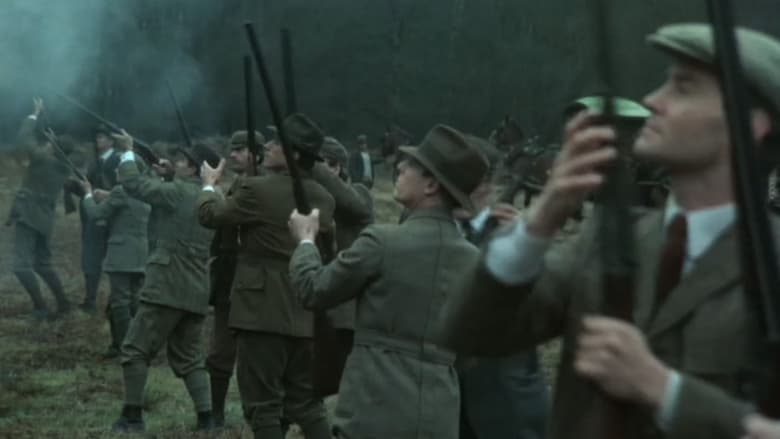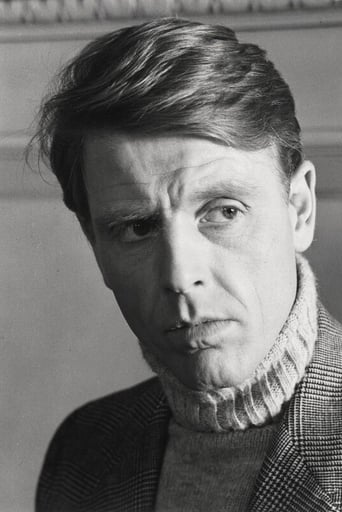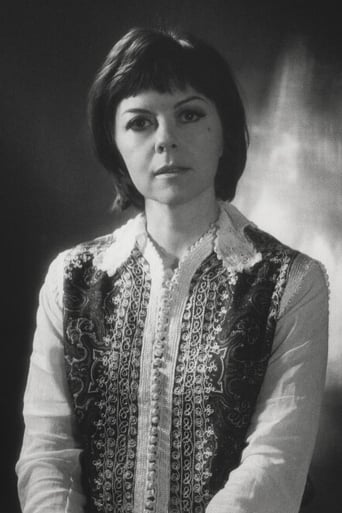

The Shooting Party (1985)
1913, shortly before the outbreak of WWI. A group of aristocrats gathers at the estate of Sir Randolph Nettleby for a weekend shoot. As the terminal decrepitude of a dying class is reflected in the social interactions and hypocrisy of its members, only world weary Sir Randolph seems to realise that the sun is setting.
Watch Trailer
Cast


Reviews
Highly Overrated But Still Good
The performances transcend the film's tropes, grounding it in characters that feel more complete than this subgenre often produces.
This is a small, humorous movie in some ways, but it has a huge heart. What a nice experience.
The film never slows down or bores, plunging from one harrowing sequence to the next.
I cannot believe how badly the point of this film must have been missed! I am no snob, but people can't have understood the core ideas behind the film as otherwise it would be regarded as a classic.I thought the film was very sad and a great reflection on a English time and traditions passing. The time of drinking fine wines and eating fresh game will be shortly over with the pending war.James Mason is just perfect in this film! He represents the "good old boy" with principles and values that the younger more competitive Edward Fox misses. This partnership is a beautiful juxtaposition, both understated and acted masterfully.ANyway, slight rant over but please watch again if you were not sure one way or the othergareth
No spoilers, even if it had a plot, because I turned it off before the end.Two things in The Shooting Party work extremely well: and both are castings against type. John Gielgud, the ultimate actor-luvvie, as an early hunt saboteur, and Gordon Jackson as a lairy professional poacher, when he usually did cap-doffing yeoman or butlers. I will say he suffers a bit of accent drift. The casting of James Mason, in his last film, as an aristocrat of the old school doesn't work because James, god bless him, does a sort of bank CEO turn (see Anthony Hopkins in Meet Joe Black), which is not the same thing at all. But that doesn't matter because this is the National Trust version of Brideshead Revisited.For the rest of them, it's the usual suspects playing at toffs, and they have a lot of fun with old cars, guns and billiard tables. Edward Fox, who was to stuck-up black-tie wearing waxworks what Burt Kwouk was to Japanese POW camp commandants, does it on autopilot and it shows. A special mention however for two of the absolutely worst child actors I've seen in a long time. Producer's kids, probably. Sorry kids, I hope you found gainful employment in accountancy later on.It's good that they have plenty to do at this country house, because as far as the audience is concerned, there's NOTHING GOING ON. Some will say that the film lyrically shows the imminent collapse of the English aristocracy on the eve of World War I; I say this film will tell you more about the collapse of the English film industry under the weight of poorly scripted son-et-lumière nostalgia masquerading as historical drama - the sort of thing Stephen Poliakoff does on TV, or used to before budgets got really tight.This, of course, is the point of The Shooting Party - it was trying to show upstart TV that UK cinema could do costume drama so much better in the 1980's. Unfortunately it was wrong. The 1981 TV version of Brideshead Revisited will tell you all you need to know about the decline of the English ruling class, as well as being a rattling good yarn. The Shooting Party isn't so much a yarn as a bit of tinsel.
"The Shooting Party" (1985) opens and closes with procession carrying a litter across an open field and receding into the distance. It is late afternoon. The wistful score underlines the autumnal sense of melancholic desolation.. It is a marvelous establishing shot setting the tone of the film while serving as a metaphor for the passing of the British Empire. "The Shooting Party" beautiful re-creates the elegiac autumn of 1913; the last Britain enjoyed before the Great War wiped out a generation of English youth, and shattered forever the confident complacency of the Edwardian world. The fabric of this society is examined through the inter-related actions of a group of aristocrats invited to spend the weekend at the estate of Sir Randolph and Lady Nettleby, along with the various servants who attend them, as well as many of the locals who live on the estate. The weekend activities include riding, discussions on art and politics, masquerades, cards, walks and picnics as well as the sport of shooting game. Also to be enjoyed will be illicit trysts, acceptable only because they remain unspoken and discreet. Lady Aline Hartlip, (Cheryl Campbell) addicted to speculation/gambling has just such a dalliance with Sir Ruben Hergersheimer, (Aharon Ipale) "the Israelite" as he is called. He pays for her gambling debts in exchange for sexual favors. It is an arrangement she is only too happy to oblige, given her loveless marriage to Lord Gilbert. It is this obsession with maintaining appearances at all costs that is one of the main preoccupations of the privileged class.While on the surface all seems well, there are tensions and stresses at work both at home and abroad threatening the stability of the established order. And they affect each of the classes. The aristocrats are determined to maintain the appearance of stability despite the looming threat of war and the fading of the old social order, while the serving class ape their masters with the hope of acquiring gentility. Lionel Stephens's manservant actually takes one of his master's discarded love letters from the waste basket in an attempt to use it's refined language to woo the maid he is in love with, while the locals hired to act as beaters for the shoot, grumble-quietly-about unfair conditions. All sense that change is coming, but still cling to the illusion that the Empire will endure, because however staid, restrictive and even provincial, it provides a sense of security and permanence. Because the aristocracy no longer fulfills its intended function as rulers, what else can it do except indulge its pleasures too seriously. This observes Sir Randolph, played by James Mason in a final film performance of immense wisdom and dignity, is a sure sign of a civilization in decline. This "playing the game" too seriously generates the unspoken rivalry between Lord Gilbert Hartlip, ( a wonderfully haughty Edward Fox) who feels his preeminence as the best shot in England being threatened by Lionel Stephens, a rising young barrister, sensitively played by Rupert Frazer. Stephens only takes up the challenge to impress his lady fair, Lady Olivia Lilburn, (Judi Bowker) with whom he is in love but who is married to his friend Lord Lilburn. Lilburn, (Robert Hardy) concerned with maintaining standards, deeply loves Olivia, but has no illusions about life being able to imitate art as his wife does. This contest of "knights" will ultimately have tragic consequences. And this is one of the points of the film; even the noblest ideals when divorced from reality must end in failure or worse, catastrophe. As the Great War proved with terrible finality the concept of "Nobless Oblige" in the modern age can be seen as not only foolish, but fatal. And yet paradoxically it is this very striving for the unattainable, the very real desire to make those ideals real, that ennobles the lives of both of the young would be lovers.In war the innocent suffer the most. In a desperate attempt to add another shot to his belt, because it is clear he is losing the contest-his wife even suggests he should cheat-Lord Gilbert accidentally wounds one of the beaters, Tom Harker, played by the wonderful Gordon Jackson in one of his best film roles. Harker is an individualist. He is also a poacher, and a supporter of Lloyd George, and much liked by the Nettlebys-especially Sir Randolph, who sees in him the embodiment of the simple life-something for which he yearns. His loss is felt personally but it is also metaphorical because it is symbolic of the terrible losses Britain will sustain in the coming war. In fact, Harker's final words are, "God save the British Empire!" and the field they carry his body across recalls those fields in Flanders and Passchendaele in which many Englishmen will cross and never return, while the large scale slaughter of the fowl at the hands of the party armed with shotguns brings to mind the horrors of the Western Front in which tens of thousands of youths will be paraded in front of machine guns and artillery only to be mowed down like so much wheat. Outrage at the blood sport is expressed by animal rights activist and pamphleteer Cornelius Cardew played with delightful eccentricity by John Gielgud. His scene with Mason, whom he is brought before for his attempt to place himself between the hunters and the hunted, is the best scene in the film and certainly the most memorable. There is a genuine warmth between these two acting greats, performing together again for the first time since their collaboration in "Julius Ceasar" thirty-one years earlier. Actually, the entire cast should take a bow for it is an impressive ensemble work. "The Shooting Party" gives us a glimpse into the mindset of an era that has long since vanished and exists now only in the mind's eye.
This film is set on a great English estate during the last days before the outbreak of World War I. A superb cast including James Mason (in his last role), Robert Hardy, Edward Fox and Gordon Jackson combine their talents to produce a wonderful, if gloomy, peek at the comfortable world of Queen Victoria and King Edward VII that was about to come tumbling down. The plot foreshadows the social and moral upheavals that will be faced but does so with a grace and subtlety that makes this a film worth seeing.




